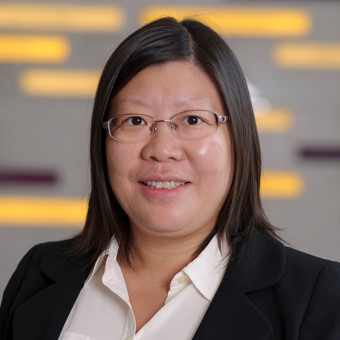Ying "Jane" Wang
Associate Professor, Mechanical Engineering
PhD, University of Washington (2006)
Expertise
Advanced materials synthesis and characterizations • new-generation electrochemical energy storage • photocatalysis • electrocatalysis • electrochromic displays • atomic layer deposition.
Biographical Sketch
Dr. Ying (Jane) Wang is an Associate Professor in the Department of Mechanical Engineering at Louisiana State University. Before starting her career at LSU, Dr. Wang worked as a Postdoc Fellow in Materials Science at Northwestern University from 2006 to 2008. She received her PhD degree in Materials Science and Engineering at University of Washington, a MA degree in Chemistry at Harvard University, and a BS degree in Chemical Physics from University of Science and Technology of China. Dr. Wang’s research integrates novel materials synthesis, additive manufacturing, and advanced characterizations to create nanostructures with atomic-level precision. Current efforts focus on next-generation rechargeable batteries, electrocatalysts, and photocatalysts for healthcare systems, wearable electronics, space exploration, and grid-scale energy storage. She has published over 100 journal articles that have received more than 10000 citations on Google Scholar and co-authored one book on nanomaterials and nanostructures, as well as many conference proceedings and several book chapters. She has received multiple awards for her academic achievements, including a Worley Professor of Excellence Award and a LSU Alumni Association Rising Faculty Research Award, etc.
Key Publications
- A. Paudel, A. N. Crum, Y. Wang, “A Full Metal-free Flexible Battery with Biodegradable Hydrogel Electrolyte”, https://doi.org/10.1039/D4TA00249K, J. Mater. Chem. A, 2024.
- S. Kuchena, A. Paudel, Q. L. Wu, Y. Wang, “A Novel Aqueous Zinc-ion Battery Capable of Self-charging at Low Temperature”, J. Mater. Chem. A, 12, 2867 – 2876 (2024).
- A. Paudel, S. Kuchena, Y. Wang, “A Full Metal-free Battery Operating Under Cold Condition Enabled by an Antisolvent”, Electrochim. Acta, 469, 143227 (2023).
- Y. Wang, S. Kuchena, “Recent Progress in Aqueous Ammonium-Ion Batteries”, ACS Omega, 7, 33732 – 33738 (2022). (Invited Review Article).
- W. W. Xu, Y. Wang, “Recent Progress on Zinc-Ion Rechargeable Batteries”, Nano-Micro Lett., 11:90 (2019) (Review article).
- Z. Q. Xie, X. W. W. Xu, X. D. Cui, Y. Wang, “Recent Progresses on Metal-Organic Frameworks and Their Derived Nanostructures for Energy and Environmental Applications”, (Review Article), ChemSusChem, 10, 1645-1663 (2017). (Top 20 most downloaded paper between July 2016 and December 2018.)
- W. W. Xu, W. W. Xie, Y. Wang, “Co3O4-xCarbon@Fe2-yCoyO3 Heterostructrual Hollow Polyhedrons for the Oxygen Evolution Reaction”, ACS Appl. Mater. & Interfaces, 9(34), 28642 – 28649 (2017).
- Y. J. Zhang, Z. Q. Xie, Z. Q. Wang, X. H. Feng, Y. Wang, A. G. Wu, “Unveiling the Adsorption Mechanism of Zeolitic Imidazolate Framework-8 with High Removal Efficiency on Copper Ions from Aqueous Solutions”, Dalton Transactions, 45, 12653 - 12660 (2016). (Featured as the back cover)
- Z. Q. Xie, X. D. Cui, W. W. Xu, Y. Wang, “Metal-Organic Framework Derived CoNi@CNTs Embedded Carbon Nanocages for Efficient Dye-Sensitized Solar Cells”, Electrochim. Acta, 229, 361-370 (2017).
